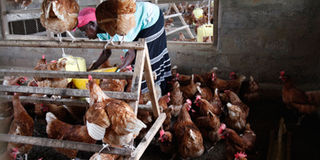What I have learnt to earn more from poultry

A farmer tends to her layers at Kabanyolo in Gayaza. Photos by Rachel Mabala
What you need to know:
The major component of farm bio-security plan is the “all-in, all-out” management approach where you get rid of a given stock after sometime, clean and disinfect the premises and leave it empty for three months before bringing the new stock, writes Subiri Obwogo
It’s 6am and I am sitting by the beach enjoying the cool breeze as I rack my brains trying to figure out how I would steer my poultry business. The sky is clear and the lake is a little calmer.
My crystal ball tells me that 2019 would bring better tidings for my business after a tough 2018, but that is if only I can implement 10 lessons learnt. You see, I came into 2018 expecting the worst. I was smarting from a nasty disease that wiped out my entire flock forcing me to de-populate, clean and disinfect the chicken pens and start afresh.
Below are the lessons I learnt in 2018 to make my poultry business better this year.
Verify feeds
First, whether you formulate your own feeds like me or rely on commercial rations, you need to test their quality regularly. You see, investing in a good chicken breed is useless if the quality of the feeds is wanting. There are many millers out there who sell substandard feeds to farmers. Poor quality feeds affect growth rate and can lead to diseases and death. Making my own feeds has helped me control the quality.
To verify, take a sample of feeds, commercial or home-made to a laboratory for testing.
You may find that feeds are the reason production of your birds has dipped drastically.
Beyond business plan
You have probably heard that before you venture into poultry farming, first develop a business plan. Okay, although it is an important working document, a business plan is just a guide to ensure the risks you take do not outweigh the benefits.
As such, it does not have to be perfect and focusing too much on it can lead to planning fatigue.
Vaccination and hygiene
I used to vaccinate my fowls against common chicken diseases such as Newcastle, Gumboro, fowl typhoid and fowl cholera and ignored farm bio-security (infection prevention) and basic hygiene practices that include things such as isolation, traffic control and sanitation. But this I changed after my flock was attacked by infectious coryza and mycoplasma, diseases that made me dispose my flock.
Another key component of farm bio-security plan is the so-called “all-in, all-out” management approach where you get rid of a given stock after sometime, clean and disinfect the premises and leave it empty for three months before bringing the new stock. The bigger lesson here is that merely vaccinating your birds against common diseases is certainly not a substitute for good hygiene practices.
Marketing
Just to be fair, marketing is such a wide and complex subject, but here’s my take: If you’re looking for buyers, don’t target anyone who eats chicken or eggs.
In fact, we read from the Holy Scriptures that although many are called, few are chosen. The idea here is to develop a product – chicken meat or eggs – to satisfy the preferences of a few but loyal customers who are willing to pay the premium.
Do not be a lone ranger
Okay, poultry industry (and farming in general), works best through networks where ideas and inputs are shared. As such, it helps to be part of a supportive network of producers, processors, financers and business experts. Reading Seeds of Gold is part of this network.
Mistakes are okay
You have probably heard that if you make the same mistake twice, you haven’t learnt anything. That is true. But then, there is something else I learnt when my loyal dog mauled 130 hens that had just started to lay eggs. That is, people who don’t make mistakes are those who take no action. The moment you stop making mistakes, it means you are not taking (calculated) risks.
Think beyond
I used to advise anyone interested in keeping poultry to think beyond chickens and consider a whole range of exciting birds like turkeys, guinea fowls, geese, ducks and peacocks.
I just discovered recently that
there’s demand for indigenous
chickens with special features such as frizzles, naked- neck, feathered feet, dwarfed, five-toed and bearded types.
Books of accounts
Besides keeping farm records related to animal husbandry practices (deaths, egg production, feed quantities, weight gained and equipment inventory), it adds value to keep books of accounts to track expenses in a systematic manner. Books of account can be used to seek grants or loans from banks and to make tax returns.
Do not quit just yet
Finally, I have come to learn that it’s easy to give up in the face of hardships. In such times, it helps to focus on short-term rewards because the big money doesn’t come quickly.
Feeds
Hens need around 20 grammes of protein every day for them to keep laying eggs. If their diet isn’t providing them with this protein then they won’t be able to lay many eggs.
To ensure your chickens are getting plenty of protein make sure you are feeding them layers pellets.
Layers pellets have been manufactured to contain all the key minerals and nutrients that hens require.
To ensure they get this amount of daylight make sure you are letting them out as close to the sun rise as possible- even if it means those early morning starts.




